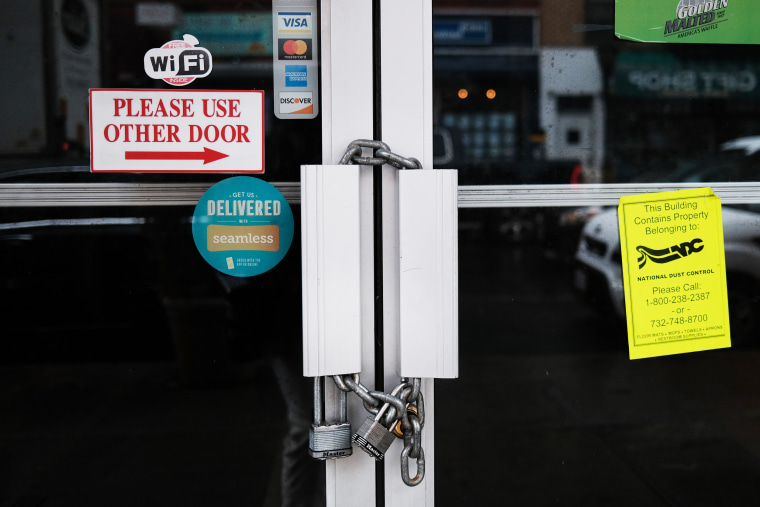Initial jobless claims soared to 853,000 last week, as the surge in coronavirus cases pushed more businesses to implement stricter measures on social distancing, forcing more people out of their job.
More than 3,000 Covid-related deaths were recorded across the country Wednesday, according to an NBC News tally.
Economists had predicted the latest weekly jobless claims total would be around 730,000, higher than the prior week's newly revised tally of 716,000, but still more than four times the pre-pandemic average of 200,000.
"This week’s report brings a substantial round of movement in the wrong direction," said AnnElizabeth Konkel, economist at Indeed Hiring Lab. "It is evident the labor market is still in crisis."
Download the NBC News app for breaking news and politics
Monthly job openings data released by the Labor Department on Wednesday also reflected the increase in layoffs, with the number of vacancies now at 6.65 million. Last Friday's monthly jobs report showed that just 245,000 jobs were recovered in the month of November, the smallest gain of the pandemic era.
"Rising infections are restraining consumer spending on services and the economy still has 9 million fewer jobs than it did before the pandemic," Robard Williams, a senior vice president at Moody’s, wrote in a note. "While we expect the labor market recovery to continue in 2021, new jobless claims remain high as governments have reimposed lockdowns to control rising infection rates, particularly impacting businesses in the high-touch service sectors."
If lawmakers fail to reach an agreement on further stimulus action, a number of crucial unemployment support programs are set to expire in a few weeks, pushing millions of Americans to the cliff’s edge and impacting the household purchasing power that fuels the economy.
"Millions losing benefits in the middle of a virus surge will likely hurt consumer spending, which could kick off a cycle of less revenue for businesses’ and slow hiring overall," Konkel said. "There is already some slippage in sectors that are at the mercy of winter. In early November, the trend in food preparation and service job postings on Indeed was down 15 percent compared to last year. But by Dec. 4, that’s slid to 18 percent below last year. There’s a lot of uncertainty ahead for the labor market going into the new year."
House Speaker Nancy Pelosi and Senate Minority Leader Chuck Schumer on Thursday rejected a $916 billion coronavirus relief proposal offered by Treasury Secretary Steven Mnuchin. That deal did not include any additional weekly federal benefits, which Democrats are demanding and the bipartisan group has endorsed.
Around 13 million Americans will lose their jobless benefits. Many more face eviction, or will find student debt has come due.
“Anyone waiting for the economy to reopen, you can starve in that period,” Diane Swonk, chief economist at Grant Thornton, told NBC News. “It’s another fiscal cliff when families have already gone over a fiscal cliff."


